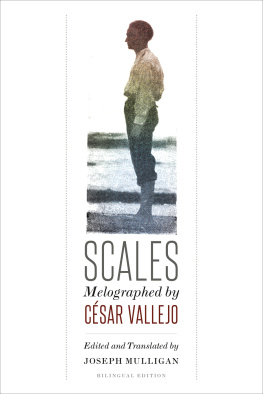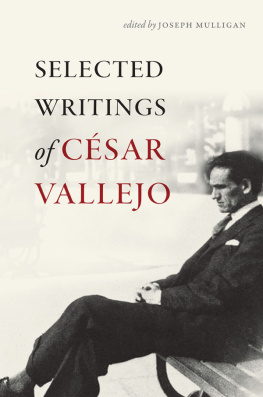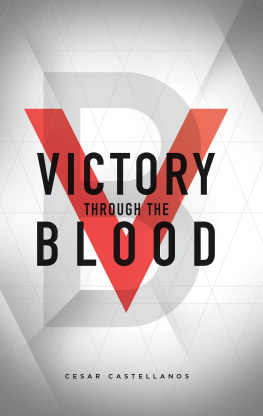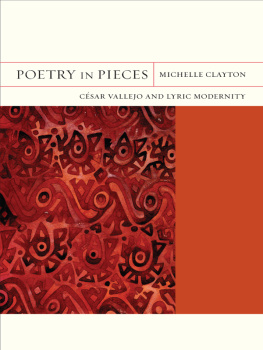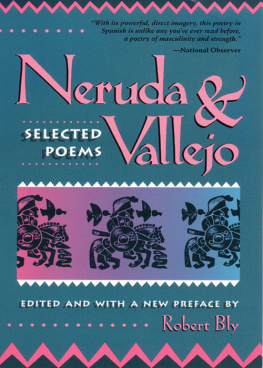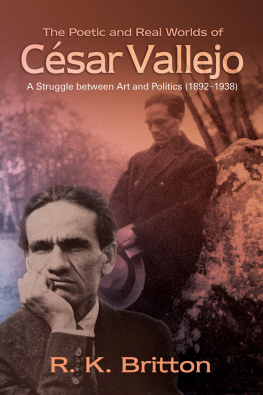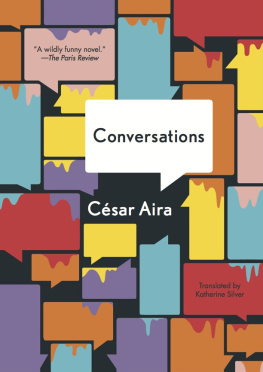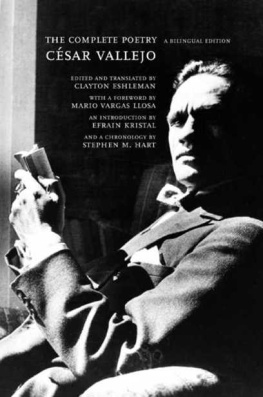Vallejo Cesar - Scales
Here you can read online Vallejo Cesar - Scales full text of the book (entire story) in english for free. Download pdf and epub, get meaning, cover and reviews about this ebook. year: 2017, publisher: Wesleyan University Press, genre: Detective and thriller. Description of the work, (preface) as well as reviews are available. Best literature library LitArk.com created for fans of good reading and offers a wide selection of genres:
Romance novel
Science fiction
Adventure
Detective
Science
History
Home and family
Prose
Art
Politics
Computer
Non-fiction
Religion
Business
Children
Humor
Choose a favorite category and find really read worthwhile books. Enjoy immersion in the world of imagination, feel the emotions of the characters or learn something new for yourself, make an fascinating discovery.
- Book:Scales
- Author:
- Publisher:Wesleyan University Press
- Genre:
- Year:2017
- Rating:3 / 5
- Favourites:Add to favourites
- Your mark:
- 60
- 1
- 2
- 3
- 4
- 5
Scales: summary, description and annotation
We offer to read an annotation, description, summary or preface (depends on what the author of the book "Scales" wrote himself). If you haven't found the necessary information about the book — write in the comments, we will try to find it.
Scales — read online for free the complete book (whole text) full work
Below is the text of the book, divided by pages. System saving the place of the last page read, allows you to conveniently read the book "Scales" online for free, without having to search again every time where you left off. Put a bookmark, and you can go to the page where you finished reading at any time.
Font size:
Interval:
Bookmark:

SCALES

Scales
Melographed by CSAR VALLEJO
Edited and Translated by JOSEPH MULLIGAN
WESLEYAN UNIVERSITY PRESS
Middletown, Connecticut
Wesleyan University Press
Middletown CT 06459
www.wesleyan.edu/wespress
2017 Joseph Mulligan
All rights reserved
Manufactured in the United States of America
Designed by Richard Hendel
Typeset in Quadraat and Johnston types by Tseng Information Systems, Inc.
The Gravest Moment of My Life, by Andrs Echevarra, originally written in Spanish especially for this volume, was translated by Joseph Mulligan.
Library of Congress Cataloging-in-Publication Data available upon request
5 4 3 2 1
Front cover illustration: Playa de Barranco, 1919. Jorge Kishimoto collection.
CONTENTS
ACKNOWLEDGMENTS
The decision to complete this translation was the fruit of conversations I had with Gladys Flores Heredia, Stephan Hart, Andrs Echevarra, Kenji Matsumoto, Jess Cabel, Jos Antonio Mazzotti, and Antonio Gonzles Montes, during and after the Congreso Internacional Vallejo Siempre, held in Lima in October 2014. Their encouragement and insight into the importance of Scales within Csar Vallejos oeuvre were strong motivations for this project. I am especially grateful to Andrs Echevarra for sharing his photographs of the ruins of Trujillo Central Jail, along with his essay that accompanies them in the appendix, and for helping set the Castilian version included here. I am in debt to Jorge Kishimoto for generously allowing me to reprint photos of Vallejo from his private collection and to Beatriz Sosa for helping me gather materials essential to this volume. Some of my translations in this volume were first published in Selected Writings of Csar Vallejo (Wesleyan University Press, 2015); my deep gratitude to Suzanna Tamminen and her team for their remarkable contribution to an intercontinental vision of Csar Vallejo.

1. Csar Vallejo, 1923. Courtesy of Jorge Kishimoto.
INTRODUCTION
Scales comes out of Csar Vallejos experimentalist phase, which is to say, between 1919 and 1923, thus making it contemporaneous with Trilce. The writing produced by the Peruvian during that period shattered many aesthetic notions prevailing in Latin America and Europe at the height of avant-garde literary production. Yet locating this Vallejo in relation to that avant-garde proves inherently problematic, because he went out of his way to oppose the notion of formulaic production, and the literary schools in question were formed around manifestos of aesthetic prescriptions.
For half a century after its first edition, Scales was read as an opportunity to contextualize Vallejos poetry, seen as indisputably superior to his narrative prose by the first critics to address it, such as Luis Mongui, Jorge Cornejo Polar, and Andr Coyn.
This introduction traces vital events relevant to the period of Scales and relates them to the other compositions that Vallejo completed before and immediately after it. Light is then thrown on major motifs and aesthetic features that provide readers unaccustomed to Vallejos unconventionality with a way to approach his writing from the early experimentalist phase. This, in turn, leads us to observe how Scales contributed to the paradigm shift in Latin American literature that brought prose fiction into the modernist period.
 The years preceding the publication of Scales were marked by several deeply felt personal losses for Vallejo, coupled with the creation of multiple major works within his oeuvre and Latin American literature The following year, under his adviser Elezar Boloa, he completed his bachelors thesis at the Universidad de Trujillo, Romanticism in Castilian Poetry, published by Tipografa Olaya. Vallejos sharp generational awareness can be felt in his thesis, specifically in relation to Jos de Espronceda and his idiosyncratic poem El diablo mundo. Through this study Vallejo learned that art must not only reflect but refract questions that drive the artist to create. The poet can no longer look to nature, read the landscape, and reflect it in a work of art. He now requires transformationa recasting of raw-materials-as-absorbed.
The years preceding the publication of Scales were marked by several deeply felt personal losses for Vallejo, coupled with the creation of multiple major works within his oeuvre and Latin American literature The following year, under his adviser Elezar Boloa, he completed his bachelors thesis at the Universidad de Trujillo, Romanticism in Castilian Poetry, published by Tipografa Olaya. Vallejos sharp generational awareness can be felt in his thesis, specifically in relation to Jos de Espronceda and his idiosyncratic poem El diablo mundo. Through this study Vallejo learned that art must not only reflect but refract questions that drive the artist to create. The poet can no longer look to nature, read the landscape, and reflect it in a work of art. He now requires transformationa recasting of raw-materials-as-absorbed.
From July to December 1917, during the days of Vallejos kindred bohemia and the rise of Grupo Norte, Vallejo dated Zoila Rosa Cuadra, whom he nicknamed Mirtho, as an allusion to Grard de Nervals famous poem Myrtho in Les Chimres (1853), in which refers to the beloved as a divine enchanteresse. Appearing as a specter in Trilce, Scales, Against Professional Secrets, and Human Poems, the mother is one of the most recurring motifs of his oeuvre.
A few months after his mothers death, Vallejo started dating Otilia Villanueva, who was the sister-in-law of one of his colleagues at Colegio Barrs, where he was teaching. This was also when he was completing his first book of poetry. The sort of spiritual thaumaturgy that Vallejo admired in Espronceda materialized in The Black Heralds, published by Souza Ferreira and distributed on July 23, 1919. It won him renown, not only through the department of La Libertad, but also in Lima, where he moved not long after its publication. From this early poetry onward, as Andrs Echevarra has recently explained, Vallejo proved time and again that he would not be a poet who writes facing a landscape but rather one who writes from a landscape, within it, surrounded by it.The Black Heralds is an early example of this and may help explain how he successfully produced an indigenous aesthetic without succumbing to an indigenist itinerary.
With the deaths of his brother, mother, and now an early mentor, Vallejo saw his losses compound and the stress fractures of a profound crisis start to show at the surface of his life. Added to that, Otilia was looking for a formal commitment from him, as they had been together for more than a year. Despite his feelings for her, he was not willing to marry. As a result of her ties to Colegio Barrs, his refusal to plan for marriage garnered him the administrations disdain, which became so unbearable that he finally resigned from his position, and by the end of July 1920 they had broken up.
On August 1 of that year, Vallejo returned from Lima to Santiago de Chuco, where riots had broken out in the wake of elections that had taken place not long before then. A general store, owned by Carlos Santa Mara, was set on fire, a bystander was shot, and two police officers were killed. With seventeen others, Vallejo was indicted. He was sought by police for almost two months, before being arrested on November 6 and detained in Trujillo Central Jail, where he would await a ruling for the next 112 days in the demoralizing conditions of a provincial jail cell.
The question of Vallejos role in the events of Santiago has long been debated by critics. One of the most thorough documentations of the event has been provided by Germn Patrn Candela. At the time of his indictment, Vallejos local celebrity wouldve been enough to garner the slander of an envious yet powerful Santa Mara, even though the official records state that Vallejo was seen holding a gun and was heard inciting others to take part in the riot. The traditional view holds that Vallejo was innocent His later socialist commitments and defense of the Spanish Republic would seem to support Harts claim, by revealing Vallejos guilt in the events of Santiago in 1920 as an early instance of his radicalism before it matured into political ideology. This, however, remains speculation, and the likelihood that a successful young
Next pageFont size:
Interval:
Bookmark:
Similar books «Scales»
Look at similar books to Scales. We have selected literature similar in name and meaning in the hope of providing readers with more options to find new, interesting, not yet read works.
Discussion, reviews of the book Scales and just readers' own opinions. Leave your comments, write what you think about the work, its meaning or the main characters. Specify what exactly you liked and what you didn't like, and why you think so.

